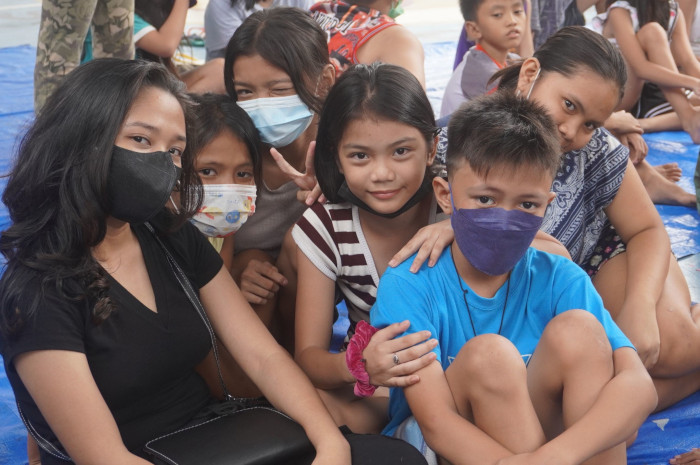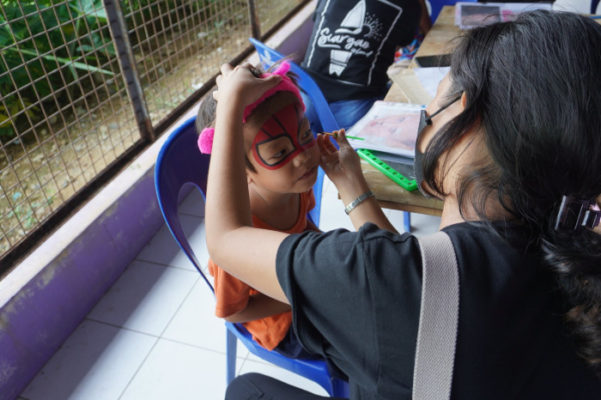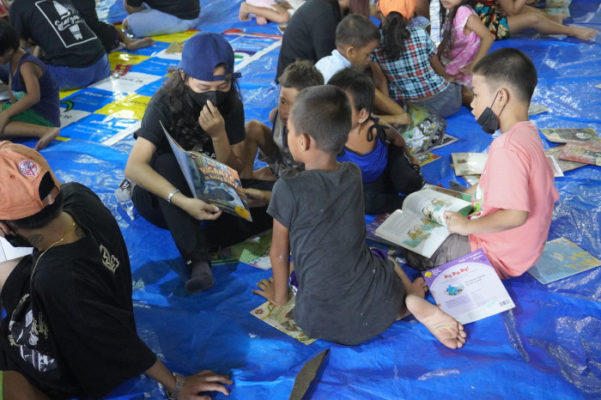Taking a Different Road
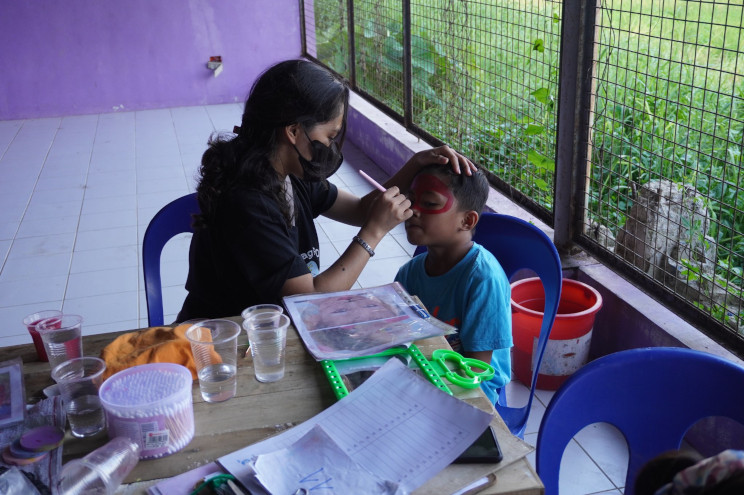
Photo above: Allen doing face painting at a Festival of Learning
Since childhood Allen has been an artist at heart. “I would be sitting and drawing. I would go anywhere and be drawing…” People told Allen she was very good, and she dreamed of studying fine arts. But as the oldest of seven children, Allen knew she was responsible for supporting her parents and younger siblings financially, a common expectation in the Philippines. I’ll get a good professional job, she thought, and maybe do art as a hobby.
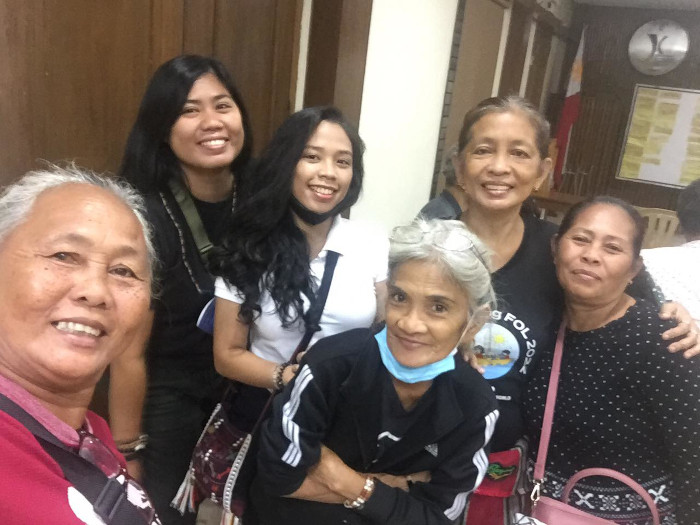
And yet today, Allen often uses art in her work, which doesn’t pay a lot either: the ATD Volunteer Corps. Her surprising story says a lot about finding personal fulfillment while making a difference. Allen might not put it quite like this, but her story is also one of great daring, quiet courage, and self-discovery.
Joining on a whim
Allen didn’t really know much about ATD when she began an internship in late 2020. She had met ATD Fourth World briefly in Thailand while volunteering in a poverty-stricken area of Bangkok. “I wasn’t quite sure what ATD was doing there,” she admits. But she thought the Volunteer Corps members, Claude and Patricia, were nice and she helped them to check the translation of a Tapori mini book while she was there.
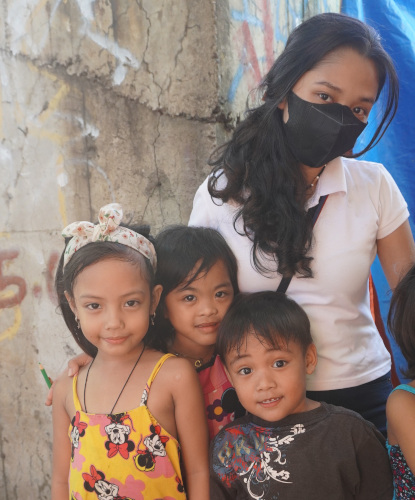
After she got home, Allen stayed in touch with Patricia who encouraged her to visit the Philippines ATD team in Manila. But Allen, who is shy, was hesitant to visit alone. “I usually only go places with friends,” she laughs. But her friend Fab was doing an internship with ATD and, during Covid, almost everything was shut down. So Allen thought it would be fun to try doing the internship too. “With a friend,” Allen said, “it’s always interesting to discover something new together.”
For Allen’s family, her decision to keep working with ATD was, as she puts it, “very challenging.” Yet in the end, Allen’s family surprised her by supporting her choice to pursue this non-traditional path, something for which Allen is very grateful.
“It was quite strange for me”
At first, the internship was not at all what she expected. Allen took part in activities with people in poverty. But she was mainly observing, just as ATD told her to do, and getting to know people.
- “It’s quite hard,” she explained, “when you want to help but its the help [observing and getting to know people] they ask you to do. What does it mean to ATD? How can it be a help?”
However, ATD assured Allen that simply getting to know people was very important. So she spent time with “facilitators” from a background of poverty who work closely with ATD. “ATD was very unique for me,” Allen said. “I’ve never done anything like this before.”
Art as empowerment
Soon, Allen was delighted to discover that ATD Fourth World uses art a lot in its activities. “For me it was very interesting to see how ATD values art as a way of expressing one’s self,” she said. But this was not art as a little enrichment on the side. It was a serious and essential tool in overcoming poverty.
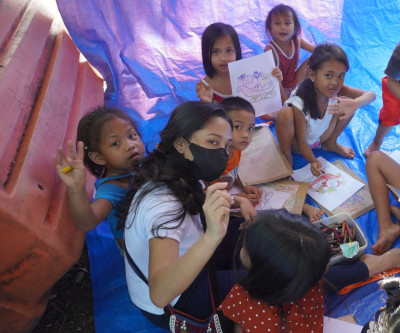
One of the first projects Allen worked on was preparing the Manila celebration of World Day for Overcoming Poverty (on October 17) through art activities. Although the project surprised her, she went to do it with Ate Gloria, a community member.
Soon, Allen realised how powerful this way of doing things is, not only using words, but also creativity. For people in poverty, life is demanding. The struggle just to survive means that there is no space for art. But ATD recognizes how important art and creativity are to life.
Art brings people joy, and creativity is essential to growth and development.
In addition, ATD uses art as a way for people to express themselves and this is immensely empowering, Allen says. She likes that ATD doesn’t fix problems for people but empowers them to act on their own to change and improve their lives. As an artist herself, Allen knows that creativity can help people move forward especially when life is very hard.
Allen at an ATD Festival of Learning:
Allen has also helped with Christmas workshops, ATD’s Festival of Learning, Street Libraries, and Youth Activities. All these projects involved using art to support learning, but also to build the community that is central to ATD’s work.
How does ATD change people’s lives?
Asked to talk about how ATD changes people’s lives, Allen explains that “it’s not a program where we do the same thing to everyone.” There is no one size fits all solution. Rather ATD provides a framework where people become empowered to escape poverty through their own initiatives.
To illustrate this, Allen tells the story of one young man. As a child, his family lived under a bridge in Manila, and he took part in an ATD Street Library there. Inspired by an artist Street Library volunteer, he longed to go to art school. But the cost was out of the question. However, after graduating from high school, he became involved with an ATD theater group. Through this group, he made connections with people who supported his art studies.
For Allen, this is an example of “empowerment.” ATD didn’t fix anything for this young man or even pay for his studies. They just provided the opportunity and connections that better-off children have naturally through their family, school, and community.
What have you learned from people in poverty?
When asked this question, Allen describes courage, personal strength, and generosity.
- “They risk their life just to get by,” she says of people she has met. “They do that every day – but it’s not easy. You know, it’s amazing how they do not fear when their life is in danger – just to bring food to the table for their family.”
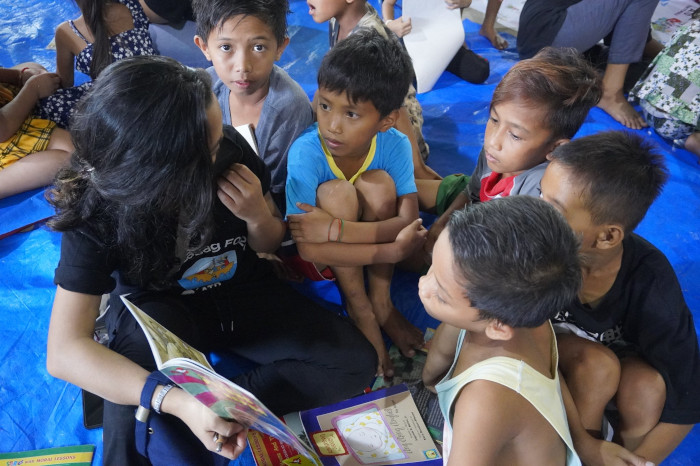
“They struggle so much not only financially but also emotionally and mentally and so much more.
“For me what was also very striking is that they refuse to recognize having mental health problems. They do not see that sometimes it’s the consequence of their living conditions. It’s very normal to have this struggle every day if you live where they live.
“What I’m learning is that it takes so much time to gain their trust. But giving them trust means so much. They can even become a leader, and you can be part of them becoming that, if you trust and support them.”
How do you see your role as a member of the Volunteer Corps?
Where Allen sees courage, determination, and the capacity for leadership, others often see irresponsibility or failure. Of the worst off families in one disadvantaged area, Allen says,
- “These people are excluded from society. But in this community itself there are people who exclude [them too].” Allen understands that part of her role as a Volunteer Corps member might be organizing projects, but another part is demonstrating that people in deep poverty are capable of success.
Allen illustrates this dual role with a story. One day, she was with the ATD Street Library in an under-resourced Manilla community. “This woman gave one of our activity papers while taking care of her sick nephew. She was very proud that he knew how to hold the pen and write his name.
“But then,” Allen continues, “the same woman saw another child who came to me saying, ‘Ate1 Allen I also want to write.’ And this woman said something like, ‘That boy is lazy, so he doesn’t know how to write.’ So I sat with this boy to see if he can, and he does! He can hold the pen and actually write. He even kept asking me to do more tracing of his name! It takes time for him… but without being judged too quickly he was able to show what he can do.
- “So I told this woman, ‘You told me he’s lazy but you see, he is capable of writing. Although he needs to practice more and would need as well encouragement and trust from the people around him.’”
Allen sees her role as encouraging people so they can recognise their own capabilities. She also wants them to see that, by encouraging others, they too can have a positive impact in their community. In fact, one thing that keeps people in poverty is other people’s attitudes. Allen hoped that this moment changed the woman’s perception and provided an example of respect and inclusion.
Youth Activities
Allen is also involved in organizing the ATD Youth Group. One major project last year was a theatrical performance at the World Day for Overcoming Poverty commemoration in Manila. Usually, the same group of adults puts on the performance year after year. However, in 2022 Allen explained, “We thought, how about we ask the youth to join this instead?”
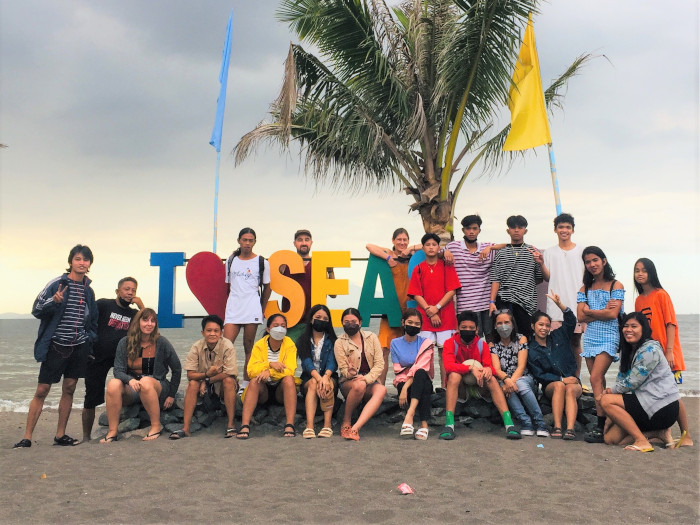
Together, the group was able to develop a way to express through song and dance their daily struggles and the importance of education. Looking back Allen says,
- “We thought it was quite ambitious but we wanted to try anyway. We will never know if it’s possible or not unless we try. It was not easy but it was quite worth it because they took pride in doing that.”
Again the project demonstrated what’s possible. And next year other young people want to get involved!
Setting aside differences
Something else with ATD surprised Allen and challenged her as someone who takes part in activities in a religious community. In the Philippines, as in many countries, politics and religion can be very divisive. Yet in ATD, people with a lot of differences work collaboratively.
- “It was very unique to me,” Allen says, “that people come together and do something even though they all have different beliefs, different religions, different communities. For me it was a challenge to really bring people together especially when they have big differences.”
When something like World Day for Overcoming Poverty becomes political, Allen explains, “We always try to put aside these things to be together to reach the goals we are here for.” While conflict is sometimes hard to avoid, Allen notes that “ATD is always a place where they can make space to set it aside.” Despite the challenges, Allen found this aspect of ATD attractive. “It’s a privilege to get to know a lot of people,” she notes.
Has working with ATD changed you as a person?
ATD has changed Allen, “Quite a lot, I think,” she muses. “I like this idea of working together more than working for them,” she says of the families she knows who live in poverty. Sometimes it’s easy to do things yourself for people, but that’s not ATD’s way.
And Allen is quite perceptive about what “working together” means in practice. She herself was never one to jump into demanding new adventures, but working with ATD has brought challenges she didn’t expect. Several years ago, for example, Allen could not have imagined herself bringing together 38 energetic young people, as she did with the ATD Youth Group’s theater performance.
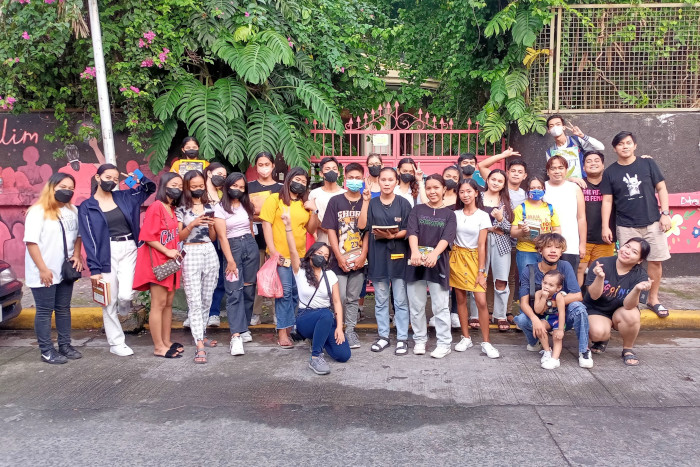
It was not easy to coordinate a one day forum for 38 young people from four different communities of Manila, a vast city. Given their difficult lives, it was hard for each one to participate. To provide support and encouragement to ATD members, the ATD team visited each young person individually making sure they were okay with their involvement.
- It seems that part of what makes Allen so effective is her intuitive grasp of how hard it can be to take the first step outside one’s comfort zone. As someone who knows how hard this can be, she appreciates what it means when people crushed by poverty dare to join ATD projects. And she recognizes the value of trust and encouragement in helping people believe in themselves. “It’s always difficult to make the first step, so I work a lot on that with them,” she says.
For a quiet and shy person, this does not come easily. “I like to stay in the background,” Allen explains. However, she feels she’s grown. “It’s changing me. It makes me ambitious and I was never very ambitious,” she laughs.
Allen admits that the day to day reality of poverty is very depressing. “You learn how they get by… They are not afraid for their life but I become afraid for them!” she exclaims. “Its amazing how committed they can be,” she says of families in poverty. “It’s not easy,” she concludes, “but it gives me hope.”
